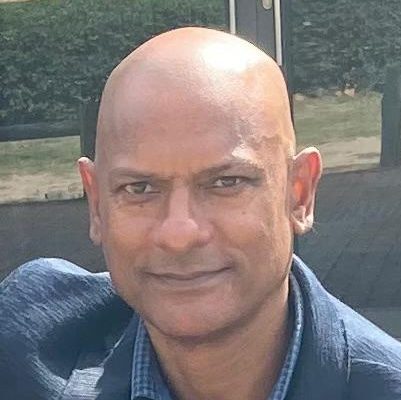“What makes a good captain is someone who dies for their team” – Cesc Fabregas
“If I have to make a tackle, then I have already made a mistake” – Paolo Maldini
The quality of a leader is reflected in the standards they set for themselves – Ray Kroc
Battswood, as a football club in the 1980s, was simply box-office.
They dominated the football landscape in the Mother City with a brand of football that drew crowds from all walks of life and all suburbs across the Cape Flats.
Their success and sensational trophy-winning achievements were founded on an extraordinary work ethic, an intimate, inseparable team dynamic, and a luminous bunch of superstar footballers.
But, as in any sports team, it needs a leader; someone to give direction, to inspire, to lead by example, and to shape all the disparate, individual parts into one connected whole – all focused on one thing only: the success of the team.
For Battswood, that leader was Ian Southgate.
He wasn’t a captain who hogged the spotlight – instead he went about his job in central defence with purpose and determination, while quietly and efficiently ensuring that Battswood always, always retained their high standards.
As Southgate tells me, when I asked him about his successful captaincy of both Battswood and the Western Province Football Board (WPFB) squads: “To lead other football players, you, yourself, must lead by example and be disciplined.”
Exemplary and disciplined aptly describe Southgate’s approach to being the leader of some of the best footballers in the Cape during the 80s.
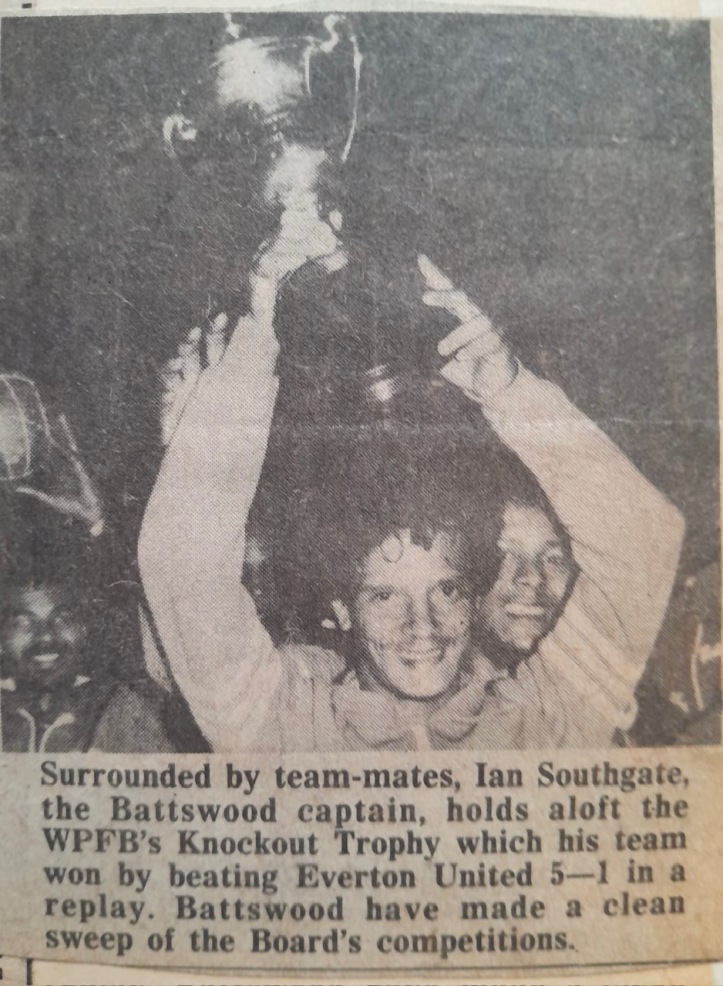
But Southgate wasn’t just a leader and a captain, he was a top, top footballer in his own right.
As a defender, he could tackle with the best of them. When aggression was needed, he was up for it. And, as his teammates attest, he loved to have “a chat” with opposing strikers in a bid to unsettle them psychologically.
But his best quality was his intuitive football brain. His anticipation, the ability to be in the right place at the right time, and summing up where the danger was before it had even happened.
As the Maldini quote in the opening of this article says: ‘If I have to make a tackle, then I have already made a mistake.’ Southgate epitomised this philosophy, such was his remarkable understanding of match situations. In short, he could read the game so instinctively, so quickly, that he’d make reading Moby Dick appear to be a children’s book.
He was nicknamed “Kaiser” – after the great Franz Beckenbauer – for his elegance in possession, dominance in defence, mastery on the ball, and innate leadership on the field. And, in the same way, that Beckenbauer often initiated Germany’s attacking forays from the back, so too was Southgate instrumental in getting Battswood on the front foot from his position in central defence.
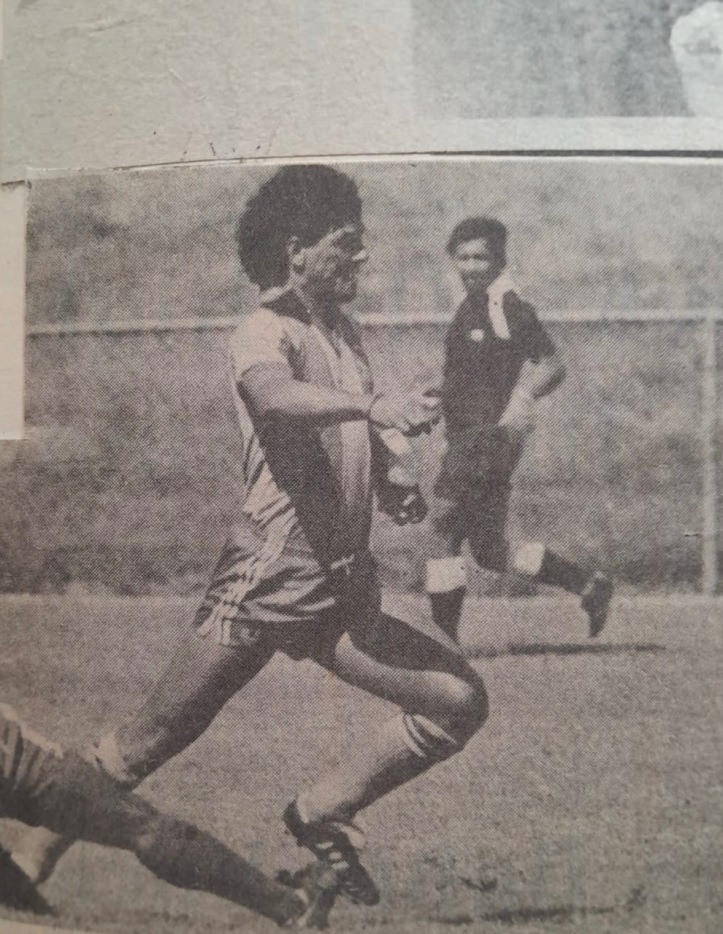
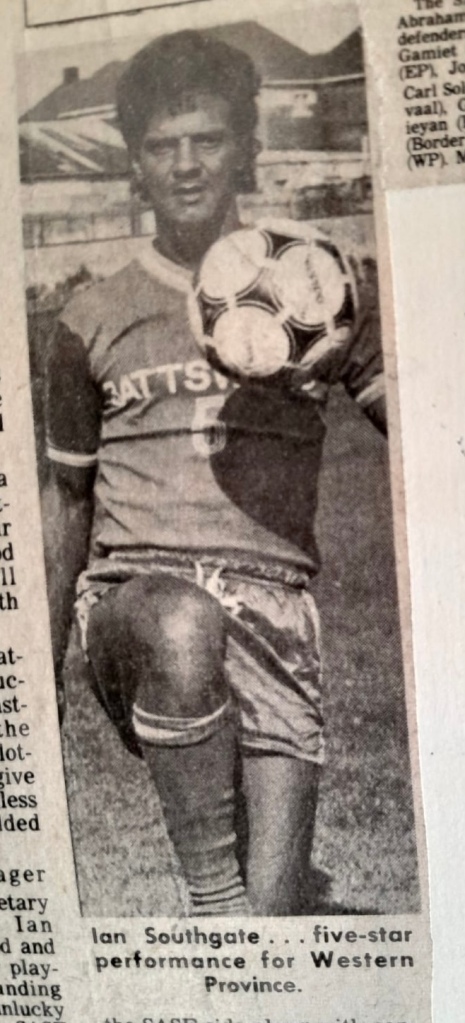
He was born in Kewtown, but the family later moved to Harfield Village. And, because his parents worked during the day, he stayed with his grandmother in Salt River during the week. As a result, he went to school in the area – Dryden Street Primary and Salt River High – and, coincidentally, those are the very same institutions at which current Banyana Banyana coach Desiree Ellis did her schooling.
To read about Desiree Ellis’ football career, click here.
His junior football career started at Squares before he joined Woodsides, the club that allowed his burgeoning talent to blossom. Like so many young footballers, role-models were crucial to Southgate’s development. And, at Woodsides, a legendary team in the 1960s/70s, Southgate was blessed to be among some of the best footballers in the Cape at the time.
Players like Doug Carelse, Vince Naude, Denver Sables, Mervyn Hawyn and Bennie Abrahams, just to name a few, took the young Southgate under their wing – and he soaked in the knowledge, grew with every game, every season, and eventually went on to become one of the best defenders in the Cape.
As a testament to his precocious ability, Southgate related the tale of how he first made it to the Woodsides first team.
“I was in Standard 7 [Grade 9], 14 years old, turning 15, when the principal called me out of class on a Monday morning,” Southgate tells me.
“He said there was someone to see me in the office. It was the great man, Bennie Abrahams [the Woodsides chairman and the first team manager at the time]. He told me, Ian, you are playing tonight…
“I said, playing for who and where … He said, for the 1st team, at Athlone Stadium tonight, in the Maggot Trophy vs Phantom Rovers, and you are playing right-back…
“It turned out that the regular right-back [Micky Moses] was injured. I said, Mr Abrahams, but I’m a forward, how can I play right-back. He said, you will… and you will do well.
“Remember, in those days, no subs were allowed… 11 started and that same 11 finished… I remember the great Bruce Solomons hurting me badly that night, but it also taught me a lesson on how to look after myself. From there, I never looked back… I played in attack as a junior and in defence as a senior.”
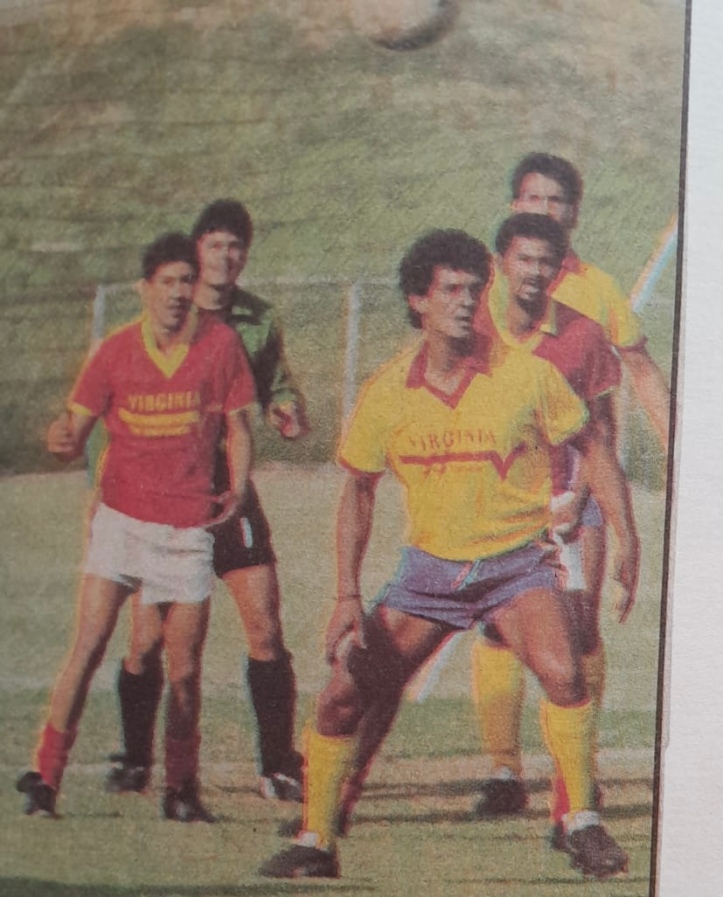
But Woodsides wasn’t the only great club Southgate was able to play a part in.
There were even bigger things on the horizon for this supremely gifted footballer.
The club was Battswood – no need to say anything else. Their achievements speak for itself.
“The move to Battswood came about when our family moved to Heathfield,” said Southgate.
“As such, travelling to Salt River for training became a problem. At that time, I was travelling to work by train and I always met Mac Campbell, the chairman of St Johns, who asked me to join his club. But the first night of training at St Johns, when I got to the field, there were only two players.
“So I left to go home at about 18:30… But, as I approached the gate at William Herbert, Battswood were on their way in for training, and Cliffie Davids, who I knew from playing board for Cape District, asked me to join the Battswood team. I trained with them that night – but, on my way home, I thought, ‘wow, these guys were the 1981 finalists in the South African Soccer Cup final.. how do I get into this team?’…”
But Southgate needn’t worry.
He linked up with Battswood, worked hard and, through sheer force of talent, ability, personality and leadership, Southgate’s success became intertwined with the incredible success of the storied Cape Town football club.
The secret, said Southgate, as so many other Battswood players have told me, was very simple: “… the team’s success was hard work in training and, more importantly, friends first, then footballers.”

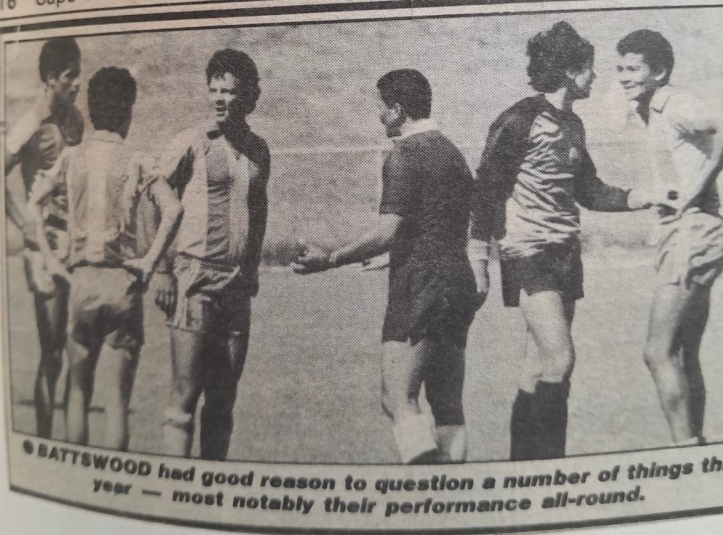
Also, as the captain of numerous iterations of WPFB squads, Southgate has an impressive record. Under his leadership and guidance, the Cape region experienced some of its own most memorable triumphs. I was in the 1986 squad which Southgate captained – and we never lost a game that season.
It was a team that included Southgate’s Battswood teammates – Adeeb Abrahams, Gerald Mentoor, Cyril Waller and Kevin “Boontjie” Jeftha – as well as Sean Lakay, Freddy Arendse, Brian Hendrikse, Johnny Schroeder and Ronald “Hurry” Campher, to name a few.
Sean Lakay is the father of Bafana Bafana star, Lyle Lakay.
The late Brian Hendrikse is the father of World Cup-winning Springbok, Jaden Hendrikse.
To read about Brian Hendrikse’s career, click here.
To read about Gerald Mentoor’s career, click here.
To read about Freddy Arendse’s career, click here. And here
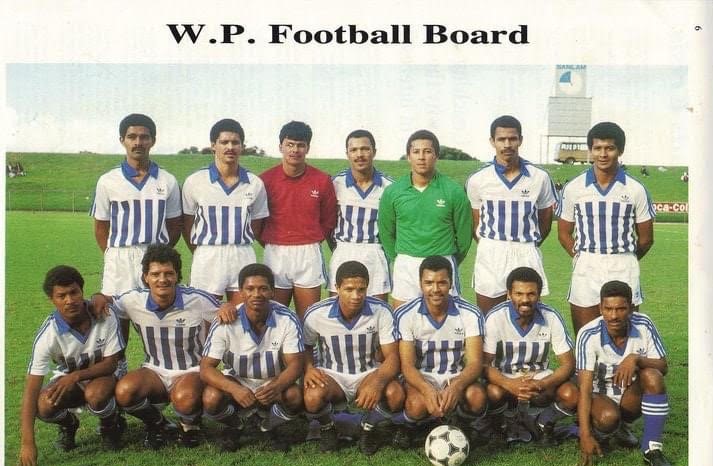
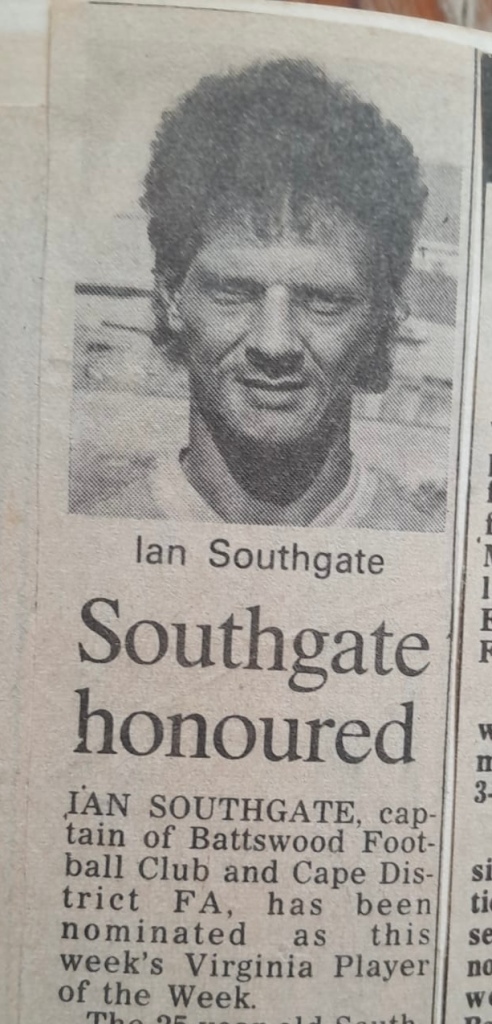
In 1989, after all Battswood’s success in the amateur ranks, it was time for the club to accept a new challenge: to elevate the club to the semi-professional Federation Professional League [FPL].
At the time, Cape neighbours Santos were the darlings of the pro ranks. Could Battswood spoil the party? [They most certainly could – and did].
For Southgate, though, tragedy was to strike – and he never got the opportunity to make the jump from amateur to pro.
Although, as he tells me, he had no regrets. Because, for him, he had “already played for two of the very best clubs in Cape Town – Woodsides and Battswood”.
Southgate explains: “I never played pro because I broke my leg at Athlone Stadium, when Battswood played Matroosfontein close to the end of the season. I played a bit in 1988, but could not get back to the level I was used to, and management also felt that I was not the same. I accepted that, also taking into account the knocks I took, having started as a senior footballer at such a young age.
“But Battswood turned pro… and, in the first year at FPL level, they made a clean sweep of every trophy on offer. And that was done with the club’s stalwarts at the time, including Adeeb Abrahams, Cliffie Davids, Royston Liddle, just to name a few…”
To read about Cliffie Davids’ career, click here
A football journey as illustrious as Southgate’s will have many, many highlights. Asked to name some, he picked out: Captaining the great 1983 Battswood team to a clean sweep of every trophy in WP and SA; WP Sportsman of the Year in 1984; Winning the inter-provincial tournament in Joburg in 1984; Captaining WP to the inter-provincial title in 1985 and 1986; Also, at the tender age of 19, captaining Cape District FA’s board team.
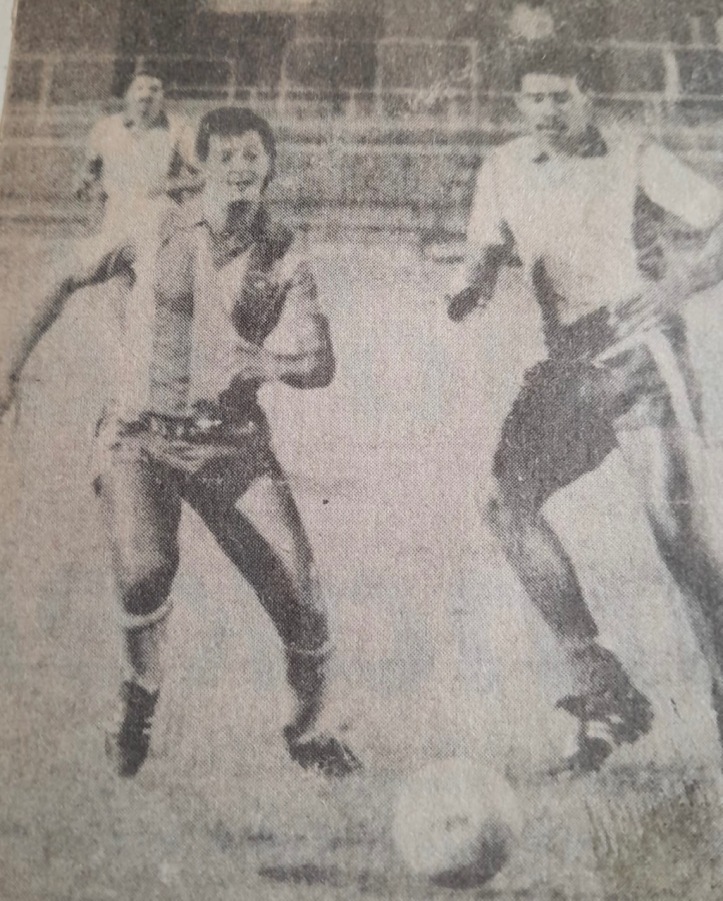
As Southgate pressed the rewind button in his memory bank, he particularly remembered Battswood’s great rivalry with Heideveld-based Everton.
“We once played Everton in the WP Knockout Cup at Vygieskraal,” he said. “We were leading 2-0. I think they had a scoring opportunity, but the ball rolled along the goal-line… However, a few Everton players celebrated a goal… [in hindsight, I can honestly say, till this day, the ball did NOT cross the line]…
“But the crowd did not see it that way… Violence erupted around the ground and the game was abandoned. We then beat them 5-1 in the replay, behind closed doors, at Avonwood Park… Everton had a very good team at the time, and they always gave us a good run for our money. They had some great players.”

Now retired from his job as machining manager at a large furniture manufacturing company, Southgate says he watches sport, which remains his big passion, and he always stays interested in “Battwood’s doings”.
More importantly, he is still in regular contact and communication with his former Battswood teammates, as they continue to live out their motto of being “friends of life”.
